冀教版英语九上《Unit 5 Great People》(lesson35)ppt课件
九年级英语Unit 5 Great people文章 爱因斯坦冀教版

word
爱因斯坦
爱因斯坦(Albert Einstein,1879-1955),举世闻名的德裔美国科学家,现代物理学的开创者和奠基人。
爱因斯坦1900年毕业于苏黎士工业大学,1909年开始在大学任教,1914年任威廉皇家物理研究所所长兼柏林大学教授。
后被迫移居美国,1940年入美国籍。
十九世纪末期是物理学的变革时期,爱因斯坦从实验事实出发,从新考查了物理学的基本概念,在理论上作出了根本性的突破。
他的一些成就大大推动了天文学的发展。
他的量子理论对天体物理学、特别是理论天体物理学都有很大的影响。
理论天体物理学的第一个成熟的方面——恒星大气理论,就是在量子理论和辐射理论的基础上建立起来的。
爱因斯坦的狭义相对论成功地揭示了能量与质量之间的关系,解决了长期存在的恒星能源来源的难题。
近年来发现越来越多的高能物理现象,狭义相对论已成为解释这种现象的一种最基本的理论工具。
其广义相对论也解决了一个天文学上多年的不解之谜,并推断出后来被验证了的光线弯曲现象,还成为后来许多天文概念的理论基础。
爱因斯坦对天文学最大的贡献莫过于他的宇宙学理论。
他创立了相对论宇宙学,建立了静态有限无边的自洽的动力学宇宙模型,并引进了宇宙学原理、弯曲空间等新概念,大大推动了现代天文学的发展。
1 / 1。
冀教版英语九年级Unit 5 Great People

Unit 5 Great People Lesson 33 What Does Life Mean?So many Questions!Let’s (思考) (关于人生的一些问题), Wang Mei. Okay. Here’s one: how do we succeed in life? I like that question. What do you think is the answer? I think that you (将会成功) if you (努力工作). I wonder (我妈妈和祖父将会怎么说). Here’s another question: what is success? Does it mean that you’re rich of famous? Is that success? I don’t know. Let’s (记下) that question. Can you think of any more? Sure! Why people (和…有区别) animals? If we didn’t have language, could we think? Do animals think? What (让我们快乐)? Do we need to be happy? Why are (世界上有些人) very poor? Can we understand everything about the world ? Why are there people? Are there people (其他世界)? Will the future be better than today? Stop! I can’t write that fast! (….的意义是什么) life? Life (是什么意思)? Not the word life ! I don’t want you to life (查字典). I want you to (思考) this: why are we (活着的)?Lesson 34 A Universe of ThoughtWhat do you think is (最重要的事) for a student? Albert Einstein (有伟大头脑的人物之一) of (上世纪). (在他的一生之中), Einstein thought about (宇宙) and (解决了许多物理问题). Einstein is (以…最为出名) his (相对论). What do you do (用你的头脑)?Y ou think! This is what I think: E=M C2He once said,I think and think for (成年累月的). (九十九次), the conclusion is (错误的). (第一百次) I am right. Einstein’s childhood and early years Einstein (出生于) 1879 in Germany. After he haod (毕业), he studied physics in Switzerland. In 1905, Einstein began to write articles about phusics. For one of those articles, he received the Nobel Prize, but not until 1921. Einstein, the teacher The important thing, Einstein said, is not to stop questioning. He also said, Anyone who has never (犯错误) has never tried (新东西). Einstein taught at universities in Switzerland and Germany. He left Germany in 1933 and went to teach at Princeton University in the United States. Einstein (去世于) 1955. One week before (他的死), he signed his last letter. The letter asked people to (放弃核武器).Quick Quiz! Did Einstein receive the Nobel Prize for the Theory of Relativity? No! It was for his work in another part of physics. Did Einstein have a wife? Y es. He had (两个妻子). He (和…离婚) his first wife. How many children did Einstein have? He had three children. His first child, a daughter, (出生于) 1903. Nobody knows (她发生了什么). Later, he had two sons.Lesson 35 China’s Most Famous FarmerEvery scientist (有一个童年的梦想). A scientist in China once (有一个梦想). He wished to grow a new type of rice. The grain of this new type of rice would be (同花生一样大) (这样)farmers could rest in the cool (阴影下)of big rice plants. This person is Yuan Longping—(杂交水稻之父).Early years Yuan Longping (出生于) 1930. He (毕业于西南农业大学) in 1953.His work He (想出) an idea for a hybrid rice (在20世纪60年代). (从那以后), he (一直致力于研究) and to the (新品种的开发). In 1973, (和..一起) other people, he succeede in the development of hybrid rice. This made China (世界领先地位) in rice (生产). For this, he (被授予) the name Father of Hybrid Rice. In 1980, the (技术) for hybrid rice (被引进到了) the United States. (由于) Professor Yuan’s hard work, China now (生产足够的水稻) to feed her people every year. (除此之外),many other countries including the U.S., (从…中受益) his work. What does he do (在业余时间)? (在业余时间), he loves (拉小提琴) and (听音乐). Every night, he reads for (半小时) before he (睡觉). He likes swimming, too. (据说) Professor Yuan is (最富有的人之一) in China. But he (关心) nothing but his research.What is he doing now? Now Professor Yuan is (从事开发) super hybrid rice. He goes to the fields (一天两次).Lesson 36 Make the world a better placeY ou (成为一名英雄), When you (关心) those around you. (树立一个好的榜样),(日复一日). This (牙医) helps other people, (因为) she (修牙). Do we all need to do things that other people?Do we need to travel and (交新朋友)? Does that make the world a better place?Lesson 37 Touch the worldHelen Keller, (众所周知的作家和教育家), died yesterday (在88岁时). Helen Keller was a hero to (盲人和聋哑人) (全世界). Helen (出生于) 1880 in the United States. When she was nineteen months old, Helen (生病了). She (发高烧). It made her blind and deaf. Before her illness, Helen had been a bright and happy girl. When she (失去视力和听力), she became difficult and wild. Helen wanted to understand other people. Sometimes, she stood (她妈妈和爸爸之间). She put her hands on their mouths. She could feel them talk. She felt one mouth move, and then (另一张嘴) move. What were they doing? Helen didn’t know. She shouted and cried. In 1887, a young teacher, Anne Sullivan, began to help Helen. She spelled words on Helen’s hand(用她的手指). (起初) the words didn’t mean anything to Helen. Then, one day, Helen was playing in some water. Anne Sullivan spelled W-A-T-E-R onto Helen’s hand. Suddenly, Helen understood. That day, she learned many more words: mother, father, sister—and teacher. (随着) Helen grew older, she learned to read. She had special books with letters she could touch. She also learned to write and even speak. When Helen studied at university, Anne Sullivan sat beside her. She (听) the professor s’ words, and then spelled their words onto Helen’s hand. After Helen finished university, she visited many countris. She spoke about her life. She (以…有名) (她的勇气)and hard work. She (尽她最大努力) to help other people who were deaf or blind. She (会被深深怀念的).Lesson 38 To China, with LoveNorman Bethune (出生于) Canada in 1890. He was a famous doctor and a nice man. Why is Norman Bethune famous? He is famous for: Finding new ways to help people with T.B.--- disease that damages the lungs. Working (作为战地医生). Inveting tools that doctors still use today. T ravelling to China. Norman Bethune (因….著名) helping Chinese people (在抗日战争中). In 1938, Bethune went to (中国北部), as he knew many people (正面临死亡) in the Anti-Japanese War. Bethune (组织了) hospital, taught doctors and nurses, and showed people (如何进行急救). He (死于) China in 1939. In China, Norman Bethune is a hero. People remember how hard he worked to help others, (日复一日的) (在困难的情况下). He once (做手术) for sixty-nine hours (不间断地). Norman Bethune (葬于唐县), Hebei Province. Shijiazhuang has the Bethune Medical School and the Bethune (国际和平医院). Canada remembers Norman Bethune, too. His house in Canada is a museum.Quick Quiz! Did Norman Bethune meet Mao Zedong? Y es, he met Mao once, in 1938. Bethune was (在去中国北部的路上), (因为) he wanted to help the people of China in the Anti-Japanese War. What (杀死) Bethune? Bethune (死于血液中毒). He had been (给…做手术) (一名受伤的战士)when he (意外的) cut his hand.Lesson 39 Guess My Hero, Danny!Monday, November 12Dear Danny,This week in class, we talked about success. We studied famus people and talked about (我们最喜欢的英雄). (今年早些时候), I had told Ms. Liu that I would like to help her teach our English class. (在星期一), she (让我做一个纵横字谜的例子). I thought it (很有趣) (因为)I had done a lot of crossword puzzles when I was in Canada. But (谁) would my puzzle be about? (日复一日的), I (问我自己) that question. I (思考它) as I walked to school. I (思考它) later as I walked home. Then I (有一个好主意). My puzzle wouldn’t be about (某个名人). But it would be about somebody who wants to be famous. I’m sending you the puzzle so you can try to guess (那是谁). Li MingT uesday, November 20Hi, Li Ming,I loved your puzzle! Y ou (选择了一个非常好的英雄). I hope he will be famous (某一天). I showed the puzzle to Jenny and Brian as we ate our lunch today. I told them that the puzzle was about a very great person. I said that this person (和他们生于同一年) they were. They couldn’t guess, so I helped them. I said that the person’s favourite food (是) a donut. (五分钟后), they had finished (整个谜语). I told them that you had made it for me. Thanks, Li Ming. Y our puzzle was fun! Danny。
英语:unit 5 《great people》教案(2)(冀教版九年级上).doc

Unit 5 Great People【本讲教育信息】一. 教学内容:Unit 5 Great People (L37—L40)1. 重点单词n. writer educator sighthearing courage waraid situation peaceblood poison soldierv. operate bury killadj. well-known blind deafgreatly northern woundedaccidentally2. 重点短语Anti-Japanese War 抗日战争at the age of…在……岁的时候give first aid 进行急救in a difficult situation 在困难的情况下make an example 举一个例子3. 重点语法被动语态。
二. 重点、难点解析及词语辨析:1. Hellen Keller, the well-known writer and educator, died yesterday at the age of 88.海伦•凯勒,著名作家,教育家,于昨天去世,享年88岁。
(L37)(1)well-known = famous “著名的”(2)die v. 死亡①Many people die of cancer last year.去年有许多人死于癌症。
②That old man died last week.那位老人上周死了。
扩展:由die组成的词组:the die is cast 木已成舟;die down 平静下来;die hard 顽固的人提示:dead和died都是死的意思,但die是动词(过去式),指的是动作;dead是形容词,指的是状态。
另外,die是瞬间动词,不能和表示一段时间的词语连用,若要用,需要be dead 来替换。
如:③This little animal has died. 这个小动物昨天死的。
冀教版英语九上《Unit 5 Great People》(Lessons33-40)word教案
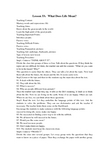
Lesson 33:What Does Life Mean?Teaching Content:Mastery words and expressions: lifeTeaching Aims:Know about the great people in the world.Learn the high spirit of the great people.Teaching Important Points:Introduce people.Passive voice.Teaching Difficult Points:Passive voice.Teaching Preparation: picturesTeaching Aid: audiotape, flashcards, picturesType of lesson: new lessonTeaching Procedure:Step1. Come to “THINK ABOUT IT”.Divide the class into groups of three or four. Talk about the questions. If they think the topics are too difficult for them, the teacher can add the content: “What do you want to be in the future? Why?”This question is easier than the others. They can talk a lot about the topic. Now lead them talk about the future, the dream and the life. It seems easier now.Step2.Listen to the tape and then let the students say the main idea about the text.S1: It deals with the future.S2: They talk about the life.S3: What is success?S4: Why are people different from animals?Then the teacher sum what they say. It tells us the life’s meaning. It leads us to think about the life. Now we are living on the earth. Some of us are happy. Others are sad. When we are free, we can think about these questions.Step3. Read the text. Let they underline the language points of this text. Ask the students to solve the problems. They can use dictionaries and ask the teacher if necessary. The teacher helps them some on the blackboard.Encourage the students to make sentences with the following language points: succeed in doing sth.; more; make one happyS5: He succeeded in finding a new way to do with the rubbish.S6: We all know he will succeed in the future.S7: Would you like some more?S8: We need ten more people.S9: Don’t make them too happy.S10: The students must keep the classroom clean.Step4. Come to “PROJECT”.Divide the class into several groups. Let every group write the questions that they want to know on a piece of paper. Then they exchange the paper with another group.They can ask the questions in class.Take your questions home. Ask your family members about the questions. First ask your parents and write their answers down. Then ask your grandparents the questions and write their answers down.Bring the answers to school. Discuss their answers in groups. Let’s see if they have any differences between their answers. Discuss why these differences exist.Now in the group discuss the last question: What did you learn from this project.In this project, we try to find the secret of life. When we are in different age, we have different realizations to life. When we are older, we will know much about the life. Step5: HomeworkFinish off the activity book.Go on the next reading in the student book.Summary:Don’t you think life is a stran ge thing? Discuss the questions Li Ming and Wang Mei asks in groups. Then encourage them to ask more questions about life. Give them time to search on the Internet to know the secret of the life. Group activities are good styles of discussing. More practice will give the students more chances to practice their spoken English.Lesson 34: A Universe of ThoughtTeaching Content:Mastery words and expressions: mind, century, anyone, deathOral words and expressions: universe, Albert Einstein, lifetime, solve, relative, Theory of Relativity, Nobel, Nobel Prize, Princeton University, unclear, weapon, divorceTeaching Aims:Know the stories of the great people.Learn more about the foreign culture.Teaching Important Points:1. Know Einstein’s life and contributi ons to the world.2. Grasp some words and expressions on physics.Teaching Difficult Points:Einstein’s life and contributions to the worldTeaching Preparation: picturesTeaching Aids: audiotape, flashcards, picturesType of lesson: new lessonTeaching Procedure:Step1. Ask the students the following questions:What do you know about Einstein?Why did Einstein succeed?If Einstein wants to make more research on physics, what difficulties must he come over?Discuss the questions in groups, and then let them report in front of the class. If you think their answers are not completely, you can let them research on the Internet to get more information.Step2. Come to “THINK AOBUT IT”.Continue to talk about the questions in formal groups. When one student in one group can’t give the complete answer the others can add what they want to say.The importance is what you think is the most important thing for a student. Let’s discuss what we can learn from Einstein.Step3. Read the text and find the answers of the following questions:What is he most famous for?Where and where was Einstein born?What did Einstein think the most important thing was?Let the students skim the text and give the right answers.Step4. Read the text further and underline the language points in this lesson. Then ask the students to present the questions in the class. Let the others try to find the answers. The teacher needs to give them right answers and explain the language points to them patients.Make a list of the language points in this lesson:famous; mind; stop doing sth.; sign; give upNow make sentences with the help of the flashcards.S1: China is famous for the Great Wall.S2: Einstein is famous for his Theory of Relativity.S3: Do you mind my opening the window?S4: Think hard with your mind, you will succeed.S5: The teacher came in. Let’s stop talking.S6: Don’t stop searching. I think we will know the truth at once.S7: Please sign here.S8: Do you remember the sign?S9: Don’t give up working hard.S10: Giving up smoking is good for your health.Step5. Listen to the tape and read after it in order to get perfect pronunciation. Play the tape again. Let them read with the books closed. Can they do it well?Step6. Come to “LET’S DO IT”.Let some students give a report in front of the class. If the others have the same opinion with him, he can stand up and add the necessary content.Step7. HomeworkFinish off the activity book.Go on the next reading in the student book.Summary:From the text, we learn not only Einstein’s stories, but also his spirit of researching. The most important thing of success is the spirit of hard work. If we want to succeedand have a meaning and colourful life, we must study hard. Now our learning situation is much better than before. We must make more progress and research more.Lesson 35: China’s Most Famous “Farmer”Teaching Content:Mastery words and expressions: farmer, so that, southwest, research, honour, technology, produce, besides, share, develop, superOral words and expressions: peanut, shadow, hybrid, graduate, agriculture, devote to, development, variety, worldwide, benefit, crossword, puzzleTeaching Aims:Know a great man of China who has made great contribution to the world.Learn the spirit of the successful man.Teaching Important Points:Grasp the words and expressions about the agriculture.Learn the development of the rice.Teaching Difficult Points:The words and expressions in the fields of rice.Teaching Preparation: picturesTeaching Aids: audiotape, flashcards, picturesType of lesson: new lessonTeaching Procedure:Step1. Show the new words with the flashcards. Let the students read the words and expressions after you. Read more times to the difficult words.Play a game to see if they have read them fluently. Divide the class into two groups. One group asks the words, the other answers. Then change their roles. They get one score if they can read a word correctly. At last, let’s see who has the higher score. The winner is the group who gets more scores.Step2.Skim the text and tell us the main idea of this lesson.Give the students three minutes. Let’s see how many students can finish the reading task in the limited time.Ask some students to demonstrate their opinion. If others think isn’t complete, they can add others in the opinion. If the teacher thinks their answers are not perfect, he or she can pay more attention to the part in the next steps.Step3.Read the text and ask questions.Finish the task in groups. Find questions about this part. Then ask the other group to answer them. If someone wants to add his own opinion, he can stand up and say his suggestion.The questions are like these:What’s Professor Yuan’s childhood dream?When was he born?What did he succeed in developing?Did foreigner countries use Professor Yuan’s technology?They can ask more questions as they like.Step4. Make sentences with the language points with the help of the flashcards. graduate fromI graduate Beijing University in 1998.Where did he graduate from?come up withAt last, he came up with a good idea.When we are in trouble, he always comes up with good ideas.devote…to…Lu Xun devoted himself to the Chinese literature.Would you like to devote yourself to the Chinese physics?because ofBecause of the rain, they didn’t go to Beijing.He did n’t pass the exam because of his carelessness.Step5. Play the tape for several times. Let the students listen carefully and have the correct pronunciation.Let some students read important paragraphs.Step6. Come to “PROJECT”Finish the puzzle. Make another in groups, and then let them exchange their puzzles. When a group finishes it, present it to the other group’s members to see if they are correct.Exchange the puzzles with the groups until all the groups have the puzzle’s answers. Then check the answers in class.Step7. HomeworkFinish off the activity book.Go on the next reading in the student book.Summary:It is necessary for us to study the performance. What have the old scientists done for us? How great they are? We must work hard at all our subjects. Whatever you do when you grow up, we must devote ourselves to the society. We must be a useful person to the world. If someone is very interested in rice, too, we can get more information on the Internet.Lesson 36: Make the World a Better PlaceTeaching Content:Mastery words and expressions: day after dayOral words and expressions: dentistTeaching Aims:Tell the students to study hard to make the world a better place to live in.More familiar to the foreign culture.Teaching Important Points:We can become heroes when we care about everything about us.Teaching Difficult Points:How to sing a foreign song well?Teaching Preparation: picturesTeaching Aids: audiotape, flashcards, picturesType of lesson: new lessonTeaching Procedure:Step1.Listen to the tape and sing after it. Play the tape for two times. Let the students sing after it.Step2. Read the text loudly as a poem.The teacher can divide the class in two groups and read the text loudly and slowly. Step3. Listen to the tape again and let the students sing together after it. If some students can’t sing them well, let’s begin the next step.Step4. Ask the students sing after the teacher line by line. Then try to sing again. Step5. Let some volunteers to sing in front of the class.Step6. M ake some more words. Add them to the song. Now let’s try the new song written by ourselves.Step7. Come to “LET’S DO IT”.Divide the class into groups and finish the task. Talk about how to make our school a better place. Let them give suggestions and write them on a piece of paper. Then report to the class. Sum the good opinions and present to the class again.Write the good suggestions on a piece of paper. Then make a poster and put it up on the wall.Step8. HomeworkFinish off the activity book.Go on the next reading in the student book.Summary:Learning to sing foreign songs is difficult for some students. We must practice more in the class. Let the students feel the atmosphere. If they can’t sing well after listening several times, the teacher must sing the song line by line and the students sing after the teacher. This demands the teacher must practice more before class.Lesson 37: Touch the WorldTeaching Content:Mastery words and expressions: blind, deaf, sight, courage, greatlyOral words and expressions: Planetary Post, Helen Keller, writer, educator, hearing,SullivanTeaching Aims:Learn the spirit of Helen Keller.Know the important thing of being a great man.Teaching Important Points:1. Learn about Helen Keller’s whole life.2. How did she come over the difficulties?Teaching Difficult Points:Know about the world of the blind and deaf.Teaching Preparation: picturesTeaching Aids: audiotape, flashcards, picturesType of lesson: new lessonTeaching Procedure:Step1. Play a game.Now let’s play a game. Who wants to come to the front? The teacher prepared a piece of cloth to cover one student’s eyes. Some others come to the front.The student with cloth covered touches the others who come to the front and guess who they are.After the game, the teacher asks the questions:Do you know them well? Is it difficult for you to guess who she or he is? Why?But there is a so great woman. She is blind and deaf, but she wrote many books and made speeches around the world to encourage the blind and deaf. Her death is a great loss to the world.Do you know who she is?Step2. Listen to the tape and answer the following questions:Who is she? What’s wrong with her?Step3. Read and Retell sth story with the flashcards and the pictures.Her mother is very patient. When there are guests, her mother often lets her sit beside her and made her hands into her mouth to feel the moving of the tongue.Step4. Activities.Now let the students work in groups. Write questions about the text on a piece of paper. Ask another group the questions.Step5. Language Points:Show some pictures to the students. Let them make sentences with the language points.Make a list of the language points:do one’s bestS1: Let’s do our best to get the first place in the exam.S2: Do your best to catch up with the others.one ….the otherS3: I have two sisters. One is a doctor, the other is a nurse.S4: They have two animals. One is a cat, the other is a dog.Step6. Come to “LET’S DO IT”.Finish this task with the help of the flashcards.Ask every student to write one person’s name who is very famous on a piece of paper. Then hand in the paper on the teacher’s desk.Let one students come here to choose one from these. Then let him or her say something about the great man.If they don’t know the person very well, the teacher uses the flashcards to help them. Show them much information, and then let them say it in English.Step7. HomeworkFinish off the activity book.Go on the next reading in the student book.Summary:The teacher tries to create more chances for the students to speak in the class. Activities are the main presentations of the class. We organized all the grammars and language points in the activities. Let them grasp the knowledge in the activities. Thus, they will think English is fun and easy.Lesson 38: To China, with LoveTeaching Content:Mastery words and expressions: war, northern, situation, operate, peace, kill, blood, wounded, soliderOral words and expression: Norman Bethune, tuberculosis, anti-Japanese, aid, bury, poison, accidentallyTeaching Aims:Peace and development is the world’s forever subject.Learn Bethune’s international spirit.Teaching Important Points:Learn the whole life of Bethune.Know more about the Anti-Japanese War.Teaching Difficult Points:some knowledge about the medical treatment and Anti-Japanese War.Teaching Preparation: picturesTeaching Aids: audiotape, flashcards, picturesType of lesson: new lessonTeaching Procedure:Step1. Come to “THINK ABOUT IT”.Divide the class into groups of three or four. Discuss the questions for a while. Then let some students report in front of the class.Step2. Listen to the tape and answer the following questions:When and where was Bethune born?Did Norman Bethune meet Mao Zedong?Step3.Read the text and check the answers. Then try to say what the main point of thislesson. Ask some students say, the others add their suggestions.Ask them to ask questions about this text. The questions can be like these:Why is Bethune famous?When did he go to Northern China?What did Chinese do to remember him?Are Canadians proud for Bethune?Step4. Deal with the language points with the help of audiotape.Make a list of the language points:be famous forS1: China is famous for the Great Wall.S2: Song Zuying is famous for her songs.be famous asS3: Binxin was famous as a writer.S4: Jay Chow is famous as a singer.Step5. Come to “LET’S DO IT”.Divide the class into groups to finish the task. If they are in trouble, they can look up the new words in the dictionary. They can ask the teacher for help.After a while, let some students give a talk in front of the class.Step6. HomeworkFinish off the activity book.Go on the next reading in the student book.Summary:Bethune was very great, because at that time, China was very poor and weak. Chinese had hard time, but Bethune, a Canadian helped us a lot. He saved many people’s lives in the war. Unluckily, he died in the war. We will remember him forever. We will learn his spirit forever. He will live in our hearts forever.Lesson 39: Guess My Hero, Danny!Teaching Content:Mastery words and expressions: whomOral words and expressions: make an exampleTeaching Aims:Learn to make a word puzzle.Know more about the foreign culture.Teaching Important Point:How to demonstrate one thing clearly.How to write an e-mail?Teaching Difficult Points:passive voiceTeaching Preparation: picturesTeaching Aids: audiotape, flashcards, picturesType of lesson: new lessonTeaching Procedure:Step1.Sum up what we learn in this unit. Let some students talk in front of the class. Let’s see who has the best answer. If one can’t give a complete answer, the others can say their suggestions.S1: This unit is about the great men in the world. What we must learn is their spirit.S2: We must work hard from now on.S3: It tells us the happiness that we have today isn’t got easily. We must value it.Step2. Read the first e-mail. Ask some students retell the story, but not word by word. If they can’t express correctly, give them time to read the text again.Step3. Activities.Divide the class into groups and ask questions about the text. Then exchange the questions and answer them. Then present their main questions and answers in class. nguage PointsRead the text again. Ask the stud ents to find the language points that they can’t understand well. Then ask the others to answer. They can say what they know about this language points. Then the teacher sums the answers and explains again to the class.Make sentences with the language points.Make a list of the language points:tryS1: I don’t know whether I could succeed, but I will try.S2: Why not try doing the experiment?the same asS3:His mother’s hair is the same colour as my mother’s.S4: I like the same music as you.Step5. Come t o “LET’S DO IT”.Finish the task in groups in formal groups. They can introduce others that they are interested in. Give them tips when they are in trouble.Step6. Make a puzzle. It is a difficult task. All the students must work hard to do it. The teacher can prepare one before class and let the students do in class. This will be very interesting.Step7. HomeworkFinish the activity book.Go on to do the exercises in the next lesson.Summary:It is easy to write an e-mail for the students in Grade 3. Let’s try again to see their abilities. Some lazy students may speak or write less than others. Leave written homework, so all the students must finish it.Lesson 40: Unit ReviewTeaching Content:Mastery words and expressions from Lessons33-39.Oral words and expressions from Lesson33-39.Teaching Important Points:Introducing important people.Passive voice.Teaching Difficult Point:Passive voiceTeaching Preparation: picturesTeaching Aids: audiotape, flashcards, picturesType of lesson: review lessonTeaching Procedure:Step1. Sum what we learn in this unit.Ask some students to talk about the subject in class. If you think one student’s answer is not complete, you can go on asking others.Step2. Practice passive voice with the help of flashcards.Let some students write some students on the blackboard to see how much on earth they about this.Explain to them in details if necessary. Practice more by the students themselves.We can let some students write questions, the others to answer them. We can finish the task in groups if you think it is necessary.Step3. Do the exercise in this lesson. Find the problems and let’s solve them together. Write the importance on the blackboard and ask for the right ways to solve them. Step4. ActivitiesDivide the class into groups to finish the task in the third part, speaking the language. The teacher lets all the students write the persons’ names that they want to know. Then ask students to come here and choose one from them. At last say something about the person that he chooses.Step5. Come to “Work in groups”.Work in groups of four. Each group member describes a classmate. The other group members guess who he or she is.Finish the task in formal groups.Step6. HomeworkFinish off the activity book.Review the unit that we learned just now.Summary:It is necessary to review the main grammars and language points in this lesson. There are eight lessons in one unit. Some students may forget some important knowledge. The teacher must remind them in time. Finish the tasks in groups and games. We must attract their interests.。
冀教版九上《Unit 5 Great People》(lesson 35)ppt课件1

4. He was so tired that he want to have a rest.
in the cool shadows of 在…的阴凉处
2.What university did he graduate from? He graduated from the Southwest Agricultural University in 1953.
LESSON 35
China’s Most Famous “Farmer”
Who is he ? Where is he ? What is he doing? What do you know about him?
“ Father” of Hybrid Rice
The Words
1973 He succeeded in the development of hybrid rice.
1980 The technology for hybrid rice was introduced to the US.
devote oneself to +名词或动名词
于
献身于;致力
• Eg:1. The doctor devoted himself to helping the sick.
Listen to the text, and answer the questions below.
1.What was Yuan’s childhood dream? 2. What university did he graduate from? 3. What idea did he come up with in the 1960s? 4.What countries have benefitted from his work? 5.What does he do in his spare time? 6.What does he care about? 7.What is he doing now?
冀教版九年级上册英语第五单元课文翻译

[ti:UNIT 5 Great People Lesson 33 What Does Life Mean?][0:00.946]UNIT 5 第五单元[0:02.521]Great People 伟人[0:04.285]Lesson 33: 第三十三课:[0:06.091]What Does Life Mean? 人生意味着什么?[0:08.785]THINK ABOUT IT![0:10.323]Do you have a happy life?[0:12.434]Why or why not?[0:15.457]What are your dreams for the future?[0:18.728]What is Wang Mei's idea about "success in life"?[0:23.609]So Many Questions! 如此多的问题![0:26.139]Let's think of some questions about life, Wang Mei. 王梅,我们来想想关于人生的问题吧。
[0:29.276]Okay. 好的。
[0:30.177]Here's one: how do we succeed in life? 这儿有一个:我们在生活中是怎样成功的?[0:34.233]I like that question. 我喜欢这个问题。
[0:35.845]What do you think is the answer? 你认为答案是什么?[0:37.924]I think that you will succeed if you work hard. 我想如果你努力的话,就会成功。
[0:41.390]I wonder what my mother and grandfather will say. 我想知道我的妈妈和外公会怎样说。
冀教版九上《Unit 5 Great People》(lesson35-36)ppt练习课件
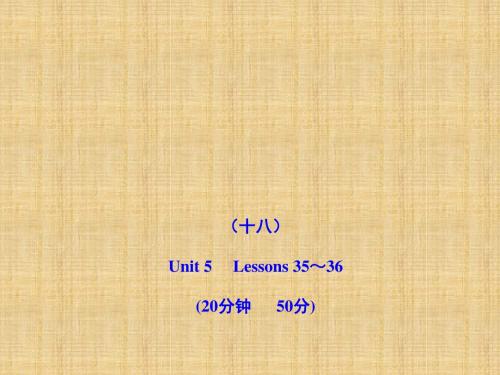
Ⅴ. 补全对话(3分钟,10分) 从方框中选择最佳选项完成对话,有两项多余。 A. What were you doing? B. I want to sleep.
Ⅲ. 单项选择(3分钟,10分) 1. The little boy likes making ____ .
A. a friend
C. friends
B. friend
D. the friends
2. Hurry up, Jack. We have to get to the station before 11:45
_____________________________________________________
答案:1. We should make our school more beautiful.
2. Has he set a good example to his son?
3. poor, need, help, we, to, people, the (. ) _____________________________________________________ 4. friends, introduced, Ann, to, was, my (. )
_____ we can catch the 12:00 train. A. since C. as soon as B. after D. so that
九年级英语上册 Unit 5 Great People教学设计 冀教版
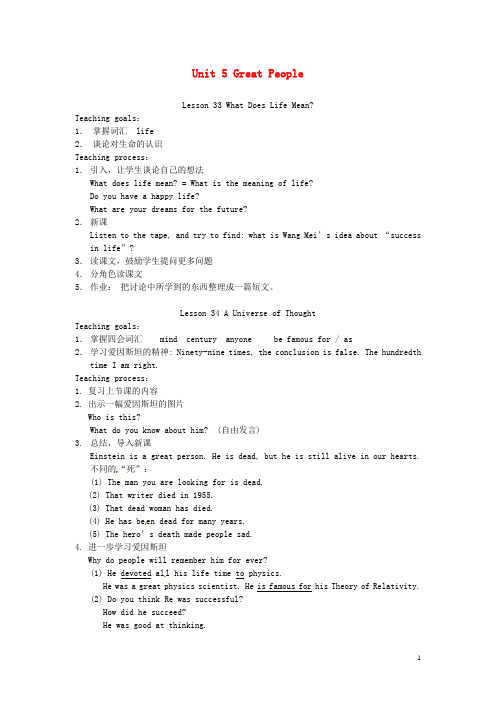
Unit 5 Great PeopleLesson 33 What Does Life Mean?Teaching goals:1.掌握词汇 life2.谈论对生命的认识Teaching process:1.引入,让学生谈论自己的想法What does life mean? = What is the meaning of life?Do you have a happy life?What are your dreams for the future?2.新课Listen to t he tape, and try to find: what is Wang Mei’s idea about “success in life”?3.读课文,鼓励学生提问更多问题4.分角色读课文5.作业:把讨论中所学到的东西整理成一篇短文。
Lesson 34 A Universe of ThoughtTeaching goals:1.掌握四会词汇 mind century anyone be famous for / as2.学习爱因斯坦的精神: Ninety-nine times, the conclusion is false. The hundredth time I am right.Teaching process:1. 复习上节课的内容2. 出示一幅爱因斯坦的图片Who is this?What do you know about him? (自由发言)3.总结,导入新课Einstein is a great person. He is dead, but he is still alive in our hearts.不同的“死”:(1) The man you are looking for is dead.(2) That writer died in 1955.(3) That dead woman has died.(4) He has be en dead for many years.(5) The hero’s death made people sad.4. 进一步学习爱因斯坦Why do people will remember him for ever?(1) He devoted al l his life time to physics.He was a great physics scientist. He is famous for his Theory of Relativity.(2) Do you think Re was successful?How did he succeed?He was good at thinking.(3) What do you do with your mind?(自主谈论)5. 读课文,了解爱因斯坦的更多信息,重点提问:As a student, what is the most important thing? The important thing is not to stop questio ning. Anyone who has never made a mistake has never tried any thing new.—Albert Einstein6. 听录音7. 分小组用英语谈论课文内容,把爱因斯坦的主要信息列出8. 作业:练习册练习活动手册Less on 35 China’s Most Famous “Farmer”Teaching goals:1.掌握词汇southwest produce develop come up with It is said. In one’s spare time.2.介绍袁隆平Teaching process:1.复习“爱因斯坦的思想”2.导入新(1) Einstein was a great physics scientist. In China, there is a great farmerscientist. Who is he? Yuan Longping.(2) What do you know about Yuan Longping.(自由谈论)3.读课文,了解袁隆平的生平4.分小组,从课文中找出袁隆平的主要信息,用英语复述。
九年级英语上册 Unit 5 Great People lesson 35 China’s most famous “farmer”课件 冀教版
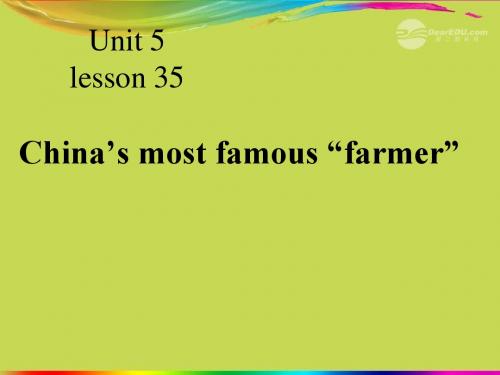
1.Preview lesson 36 2.Recite the text
Unit 5 lesson 35
China’s most famous “farmer”
Listen and fill in the blanks
• 1. He ____ ___ ____ an idea for a bybrid rice in the ____. Since then, he has ________ _____ __ research. • 2. This____ China a worldwide leader in rice production. For this, he ___ ______ ____ the name . • 3. Many other countries including the U.S., have ________ ___ this work.
3、What did he do?
• devote oneself/sth. to sth./doing • 把自己奉献给…
他用他部分的时间从事历史的研究。 He ________ part of his time ___ the study of history.
王老师把自己奉献于教育事业。 Ms.Wang __________ herself ___ English teaching/teaching English.
• 5. Do other countries grow Hybrid Rice? Give me an example.
• 6. Besides, many other countries including the U.S., have benifitted from his work. What’s the meaning of “besides”?
冀教版英语Book 5 Great PeopleLesson 35 China’s Most Famous“Father”
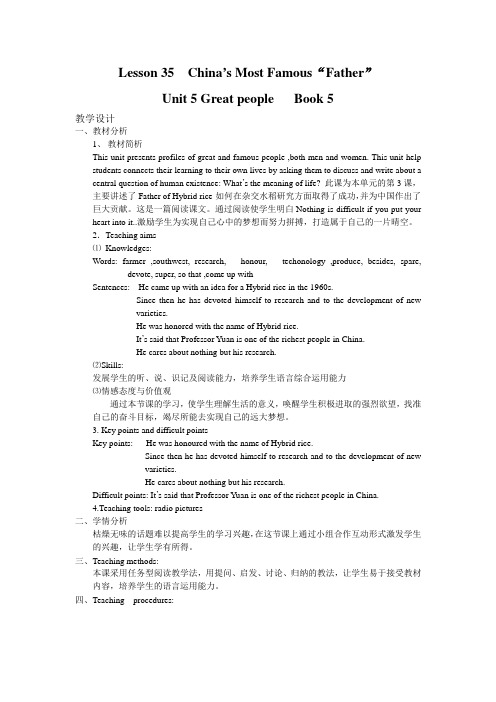
Lesson 35 China’s Most Famous“Father”Unit 5 Great people Book 5教学设计一、教材分析1、教材简析This unit presents profiles of great and famous people ,both men and women. This unit help students connects their learning to their own lives by asking them to discuss and write about a central question of human existence: What’s the meaning of life? 此课为本单元的第3课,主要讲述了Father of Hybrid rice-如何在杂交水稻研究方面取得了成功,并为中国作出了巨大贡献。
这是一篇阅读课文。
通过阅读使学生明白Nothing is difficult if you put your heart into it..激励学生为实现自己心中的梦想而努力拼搏,打造属于自己的一片晴空。
2.Teaching aims⑴Knowledges:Words: farmer ,southwest, research, honour, techonology ,produce, besides, spare, devote, super, so that ,come up withSentences: He came up with an idea for a Hybrid rice in the 1960s.Since then he has devoted himself to research and to the development of newvarieties.He was honored with the name of Hybrid rice.It’s said that Professor Yuan is one of the richest people in China.He cares about nothing but his research.⑵Skills:发展学生的听、说、识记及阅读能力,培养学生语言综合运用能力⑶情感态度与价值观通过本节课的学习,使学生理解生活的意义,唤醒学生积极进取的强烈欲望,找准自己的奋斗目标,竭尽所能去实现自己的远大梦想。
英语冀教版九年级上Unit5GreatPeopleLesson35(课件)
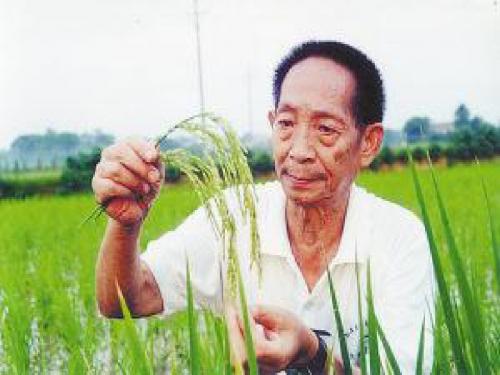
in the 1980s或in the 1980’s
6. because of “由于,因为”,后接名词/代词/ v-ing 形式
because 用来引导原因状语从句 eg: 他因为起来晚了而没能准时上学.
eg:他全心致力于教育学生.
He devotes himself to teaching .
4.The technology for hybrid rice was introduced to the United States.
一般现在时的被动语态:be (am/is/are) +v(pp) 一般过去时的被动语态:be (was/were) +v(pp)
单项选择
1.He is devoting himself to __A__ .
A. writing B. to write C .write D. wrote
2.The volleyball match was put off __D__the heavy rain.
A. because B. with C. to D. because of
so that 引导目的状语从句, “为的是;以便”,表示做某 事的目的,句中常常有情态动词can, could, may, might等; eg: 所有学生都努力地学习以便能通过考试。 All the students studied hard so that they could pass the exams.
3.据说袁教授是中国最富有的人之一。
__I_t_is__s_a_id___that Professor Yuan is one of the richest people in China.
Unit 5 Great People lesson 35课件(冀教版九上)

9 [ri'sə:tʃ]research 研究,调查 n./v. 10[di'vəut] devote 付出 v. devoted 11devote to 致力于,献身于
12[di'veləpmənt]development 开发 发展n.
13 [di'veləp]develop 培育,使形成,发展vt. 14 [və'raiəti] variety 变化,多样化n. 15['ɔnə]honour=honor光荣荣誉n./ v. 16[tek'nɔlədʒi] technology 技术n.
3)This magazine _is__d_e_v_o__te_d__t_o
(专门刊载)science.
New word
新品种的开发 the development of new varieties.
1)In 1973,he succeeded in _th_e_d_ev_elo_pm_en_t o_f hy_br_id r_ice___________(杂交
22['sju:pə] super 优良的,超级的 adj. 23['krɔswə:d] crossword 纵横字谜n.
24['pʌzl] puzzle (字画) 迷n.
New word -Who is China’s most
famous “farmer” -Yuan Longpin.
He is a _r_ic_e__f_a_r_m__e_r.
n.学术研究 researches 关心
1)He c__a_r_e__s__a_b__o_u__t nothing but his research of hybrid rice.
九年级英语上册Unit5 Great People冀教版
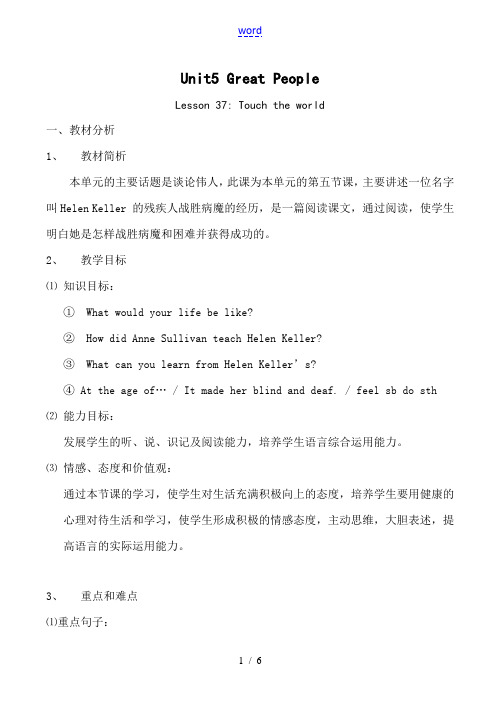
Unit5 Great PeopleLesson 37: Touch the world一、教材分析1、教材简析本单元的主要话题是谈论伟人,此课为本单元的第五节课,主要讲述一位名字叫Helen Keller 的残疾人战胜病魔的经历,是一篇阅读课文,通过阅读,使学生明白她是怎样战胜病魔和困难并获得成功的。
2、教学目标⑴知识目标:① What would your life be like?② How did Anne Sullivan teach Helen Keller?③ What can you learn from Helen Keller’s?④At the age of… / It made her blind and deaf. / feel sb do sth ⑵能力目标:发展学生的听、说、识记及阅读能力,培养学生语言综合运用能力。
⑶情感、态度和价值观:通过本节课的学习,使学生对生活充满积极向上的态度,培养学生要用健康的心理对待生活和学习,使学生形成积极的情感态度,主动思维,大胆表述,提高语言的实际运用能力。
3、重点和难点⑴重点句子:It made her blind and deaf.She became difficult and wild.She felt one mouth move, and the other mouth move.She was famous for her courage and hard work.She will be greatly missed.⑵难点:Let’s do it!Who do you most admire? What is his or her job? What great or interesting things has he or she done? What can we learn from him or her?原因是学生词汇量有限,口语表达能力欠缺,设置为小作文的形式让学生自由表达,以降低难度。
九年级英语Unit 5 Great people文章 白求恩冀教版
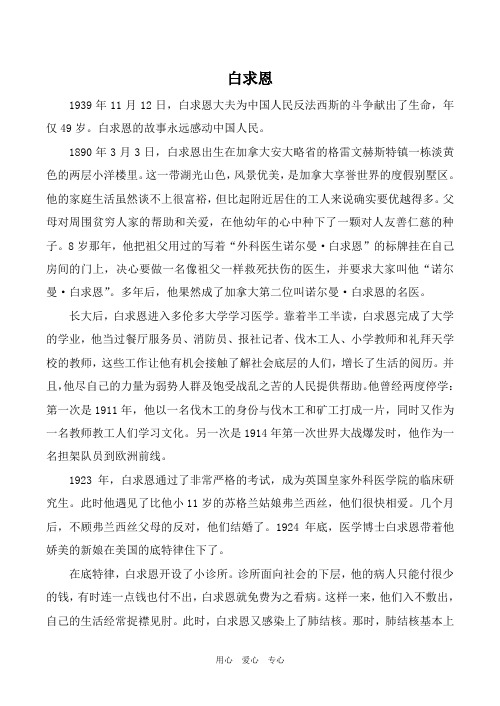
白求恩1939年11月12日,白求恩大夫为中国人民反法西斯的斗争献出了生命,年仅49岁。
白求恩的故事永远感动中国人民。
1890年3月3日,白求恩出生在加拿大安大略省的格雷文赫斯特镇一栋淡黄色的两层小洋楼里。
这一带湖光山色,风景优美,是加拿大享誉世界的度假别墅区。
他的家庭生活虽然谈不上很富裕,但比起附近居住的工人来说确实要优越得多。
父母对周围贫穷人家的帮助和关爱,在他幼年的心中种下了一颗对人友善仁慈的种子。
8岁那年,他把祖父用过的写着“外科医生诺尔曼·白求恩”的标牌挂在自己房间的门上,决心要做一名像祖父一样救死扶伤的医生,并要求大家叫他“诺尔曼·白求恩”。
多年后,他果然成了加拿大第二位叫诺尔曼·白求恩的名医。
长大后,白求恩进入多伦多大学学习医学。
靠着半工半读,白求恩完成了大学的学业,他当过餐厅服务员、消防员、报社记者、伐木工人、小学教师和礼拜天学校的教师,这些工作让他有机会接触了解社会底层的人们,增长了生活的阅历。
并且,他尽自己的力量为弱势人群及饱受战乱之苦的人民提供帮助。
他曾经两度停学:第一次是1911年,他以一名伐木工的身份与伐木工和矿工打成一片,同时又作为一名教师教工人们学习文化。
另一次是1914年第一次世界大战爆发时,他作为一名担架队员到欧洲前线。
1923年,白求恩通过了非常严格的考试,成为英国皇家外科医学院的临床研究生。
此时他遇见了比他小11岁的苏格兰姑娘弗兰西丝,他们很快相爱。
几个月后,不顾弗兰西丝父母的反对,他们结婚了。
1924年底,医学博士白求恩带着他娇美的新娘在美国的底特律住下了。
在底特律,白求恩开设了小诊所。
诊所面向社会的下层,他的病人只能付很少的钱,有时连一点钱也付不出,白求恩就免费为之看病。
这样一来,他们入不敷出,自己的生活经常捉襟见肘。
此时,白求恩又感染上了肺结核。
那时,肺结核基本上是不治之症。
白求恩不想耽误弗兰西丝的青春年华,提出离婚。
弗兰西丝不同意,但最终拗不过决心已定的白求恩,含泪回了苏格兰。
冀教版九年级上册《unit 5 great people》教案和练习上(重点资料).doc
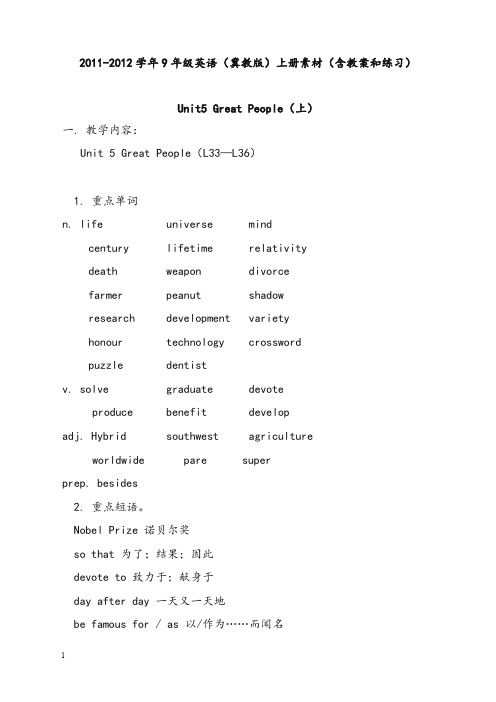
2011-2012学年9年级英语(冀教版)上册素材(含教案和练习)Unit5 Great People(上)一. 教学内容:Unit 5 Great People(L33—L36)1. 重点单词n. life universe mindcentury lifetime relativitydeath weapon divorcefarmer peanut shadowresearch development varietyhonour technology crosswordpuzzle dentistv. solve graduate devoteproduce benefit developadj. Hybrid southwest agricultureworldwide pare superprep. besides2. 重点短语。
Nobel Prize 诺贝尔奖so that 为了;结果;因此devote to 致力于;献身于day after day 一天又一天地be famous for / as 以/作为……而闻名come up with 发现It’s said that…据说set an example 树立榜样3. 交际用语。
介绍人物。
二. 重点、难点解析及词语辨析。
1. What makes us happy? 什么使我们快乐?{L33}make sb./sth .+ adj.使某人/某物……① The news made her excited. 这消息使她兴奋。
② Reading makes me happy. 读书使我快乐。
make oneself understood 表明某人的意思③ Can you easily make yourself understood in English?你能用英语轻易表明你的意思吗?2. What does life mean? 生活是什么意思?(L33)What does … mean?=What’s the meaning of …?=What do you mean by…? 是什么意思?① What does “quick” mean ? “quick”是什么意思?=What’s the meaning of “quick”?=What do you mean by “quick”?3. What do you do with your mind ?你用你的思想做什么?(L34)mind(1)n.记忆;思想;智力等keep sth. in mind 记住某事物①She always keeps that thing in mind. 她总记着那件事。
九年级英语上册 Unit 5 Great People Lesson 35课件 冀教版
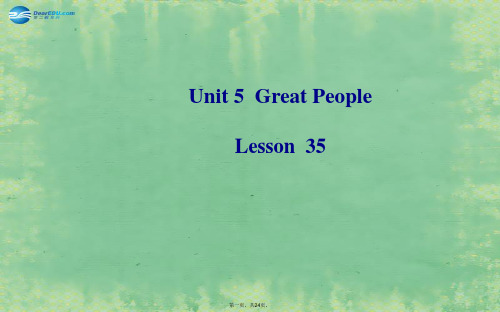
答案:①honor me with
②in honor of
第十二页,共24页。
3. Besides, many other countries including the U. S. , have benefitted from
his work. 另外,包括美国在内的许多其他国家也从他的工作中受益。
2. —We’re all here _______Lily. Where’s she?
—She has gone to the library.
A. beside
B. besides
C. except
D. of
第二十二页,共24页。
3. The digital camera is _______ expensive _______ I can’t afford
例如:Will
you
honor
me
with with a
visit?
可否请您光临?
第十页,共24页。
【归纳拓展】 honor的名词词性 (1)作_不__可__数__名___词_,意为“尊敬,崇敬”,作_可__数__名_词___,意为 “光荣;荣幸”。例如:It was a great honor to be invited here today. 今天承蒙邀请到此,深感荣幸。 (2) _i_n_h_o_n__o_r_o_f_. _.向. ……表示敬意;为了庆祝……。 例如:There is a party tonight in honor of the new chairman. 为 向新主席(zhǔxí)表示欢迎今晚将举行晚会。
Unit 5 Great People Lesson 35
第一页,共24页。
九年级上) 九年级英语上:Unit5 Great People 教案(冀教版)

Lesson 33:What Does Life Mean?Teaching Content:Mastery words and expressions: lifeTeaching Aims:Know about the great people in the world.Learn the high spirit of the great people.Teaching Important Points:Introduce people.Passive voice.Teaching Difficult Points:Passive voice.Teaching Preparation: picturesTeaching Aid: audiotape, flashcards, picturesType of lesson: new lessonTeaching Procedure:Step1. e to “THINK ABOUT IT”.Divide the class into groups of three or four. Talk about the questions. If they think the topics are too difficult for them, the teacher can add the content: “What do you want to be in the future? Why?”This question is easier than the others. They can talk a lot about the topic. Now lead them talk about the future, the dream and the life. It seems easier now.Step2.Listen to the tape and then let the students say the main idea about the text.S1: It deals with the future.S2: They talk about the life.S3: What is success?S4: Why are people different from animals?Then the teacher sum what they say. It tells us the life’s meaning. It leads us to think about the life. Now we are living on the earth. Some of us are happy. Others are sad. When we are free, we can think about these questions.Step3. Read the text. Let they underline the language points of this text. Ask the students to solve the problems. They can use dictionaries and ask the teacher if necessary. The teacher helps them some on the blackboard.Encourage the students to make sentences with the following language points: succeed in doing sth.; more; make one happyS5: He succeeded in finding a new way to do with the rubbish.S6: We all know he will succeed in the future.S7: Would you like some more?S8: We need ten more people.S9: Don’t make them too happy.S10: The students must keep the classroom clean.Step4. e to “PROJECT”.Divide the class into several groups. Let every group write the questions that they want to know on a piece of paper. Then they exchange the paper with another group. They can ask the questions in class.Take your questions home. Ask your family members about the questions. First ask your parents and write their answers down. Then ask your grandparents the questions and write their answers down.Bring the answers to school. Discuss their answers in groups. Let’s see if they have any differences between their answers. Discuss why these differences exist.Now in the group discuss the last question: What did you learn from this project.In this project, we try to find the secret of life. When we are in different age, we have different realizations to life. When we are older, we will know much about the life. Step5: HomeworkFinish off the activity book.Go on the next reading in the student book.Summary:Don’t you think life is a strange thi ng? Discuss the questions Li Ming and Wang Mei asks in groups. Then encourage them to ask more questions about life. Give them time to search on the Internet to know the secret of the life. Group activities are good styles of discussing. More practice will give the students more chances to practice their spoken English.Lesson 34: A Universe of ThoughtTeaching Content:Mastery words and expressions: mind, century, anyone, deathOral words and expressions: universe, Albert Einstein, lifetime, solve, relative, Theory of Relativity, Nobel, Nobel Prize, Princeton University, unclear, weapon, divorceTeaching Aims:Know the stories of the great people.Learn more about the foreign culture.Teaching Important Points:1. Know Einstein’s life and contributions to the world.2. Grasp some words and expressions on physics.Teaching Difficult Points:Einstein’s life and contributions to the worldTeaching Preparation: picturesTeaching Aids: audiotape, flashcards, picturesType of lesson: new lessonTeaching Procedure:Step1. Ask the students the following questions:What do you know about Einstein?Why did Einstein succeed?If Einstein wants to make more research on physics, what difficulties must he e over? Discuss the questions in groups, and then let them report in front of the class. If you think their answers are not pletely, you can let them research on the Internet to get more information.Step2. e to “THINK AOBUT IT”.Continue to talk about the questions in formal groups. When one student in one group can’t g ive the plete answer the others can add what they want to say.The importance is what you think is the most important thing for a student. Let’s discuss what we can learn from Einstein.Step3. Read the text and find the answers of the following questions:What is he most famous for?Where and where was Einstein born?What did Einstein think the most important thing was?Let the students skim the text and give the right answers.Step4. Read the text further and underline the language points in this lesson. Then ask the students to present the questions in the class. Let the others try to find the answers. The teacher needs to give them right answers and explain the language points to them patients.Make a list of the language points in this lesson:famous; mind; stop doing sth.; sign; give upNow make sentences with the help of the flashcards.S1: China is famous for the Great Wall.S2: Einstein is famous for his Theory of Relativity.S3: Do you mind my opening the window?S4: Think hard with your mind, you will succeed.S5:The teacher came in. Let’s stop talking.S6: Don’t stop searching. I think we will know the truth at once.S7: Please sign here.S8: Do you remember the sign?S9: Don’t give up working hard.S10: Giving up smoking is good for your health.Step5. Listen to the tape and read after it in order to get perfect pronunciation. Play the tape again. Let them read with the books closed. Can they do it well?Step6. e to “LET’S DO IT”.Let some students give a report in front of the class. If the others have the same opinion with him, he can stand up and add the necessary content.Step7. HomeworkFinish off the activity book.Go on the next reading in the student book.Summary:From the text, we learn not only Einstein’s stories, but also his spirit of researching. The most important thing of success is the spirit of hard work. If we want to succeed and have a meaning and colourful life, we must study hard.Now our learning situation is much better than before. We must make more progress and research more.Lesson 35: China’s Most Famous “Farmer”Teaching Content:Mastery words and expressions: farmer, so that, southwest, research, honour, technology, produce, besides, share, develop, superOral words and expressions: peanut, shadow, hybrid, graduate, agriculture, devote to, development, variety, worldwide, benefit, crossword, puzzleTeaching Aims:Know a great man of China who has made great contribution to the world.Learn the spirit of the successful man.Teaching Important Points:Grasp the words and expressions about the agriculture.Learn the development of the rice.Teaching Difficult Points:The words and expressions in the fields of rice.Teaching Preparation: picturesTeaching Aids: audiotape, flashcards, picturesType of lesson: new lessonTeaching Procedure:Step1.Show the new words with the flashcards. Let the students read the words and expressions after you. Read more times to the difficult words.Play a game to see if they have read them fluently. Divide the class into two groups. One group asks the words, the other answers. Then change their roles.They get one score if they can read a word correctly. At last, let’s see who has the higher score. The winner is the group who gets more scores.Step2.Skim the text and tell us the main idea of this lesson.Give the students three minutes. Let’s see how many students can finish the reading task in the limited time.Ask some students to demonstrate their opinion. If others think isn’t plete, they can add others in the opinion. If the teacher thinks their answers are not perfect, he or shecan pay more attention to the part in the next steps.Step3.Read the text and ask questions.Finish the task in groups. Find questions about this part. Then ask the other group to answer them. If someone wants to add his own opinion, he can stand up and say his suggestion.The questions are like these:What’s Professor Yuan’s childhood dream?When was he born?What did he succeed in developing?Did foreigner countries use Professor Yuan’s technology?They can ask more questions as they like.Step4. Make sentences with the language points with the help of the flashcards. graduate fromI graduate BeijingUniversity in 1998.Where did he graduate from?e up withAt last, he came up with a good idea.When we are in trouble, he always es up with good ideas.devote…to…Lu Xun devoted himself to the Chinese literature.Would you like to devote yourself to the Chinese physics?because ofBecause of the rain, they didn’t go to Beijing.He didn’t pass the exam because of his car elessness.Step5. Play the tape for several times. Let the students listen carefully and have the correct pronunciation.Let some students read important paragraphs.Step6. e to “PROJECT”Finish the puzzle. Make another in groups, and then let them exchange their puzzles. When a group finishes it, present it to the other group’s members to see if they are correct.Exchange the puzzles with the groups until all the groups have the puzzle’s answers. Then check the answers in class.Step7. HomeworkFinish off the activity book.Go on the next reading in the student book.Summary:It is necessary for us to study the performance. What have the old scientists done for us? How great they are? We must work hard at all our subjects. Whatever you do when you grow up, we must devote ourselves to the society. We must be a useful person to the world. If someone is very interested in rice, too, we can get more information on the Internet.Lesson 36: Make the World a Better PlaceTeaching Content:Mastery words and expressions: day after dayOral words and expressions: dentistTeaching Aims:Tell the students to study hard to make the world a better place to live in.More familiar to the foreign culture.Teaching Important Points:We can bee heroes when we care about everything about us.Teaching Difficult Points:How to sing a foreign song well?Teaching Preparation: picturesTeaching Aids: audiotape, flashcards, picturesType of lesson: new lessonTeaching Procedure:Step1.Listen to the tape and sing after it. Play the tape for two times. Let the students sing after it.Step2. Read the text loudly as a poem.The teacher can divide the class in two groups and read the text loudly and slowly. Step3. Listen to the tape again and let the students sing together after it. If some students can’t sing them well, let’s begin the next step.Step4. Ask the students sing after the teacher line by line. Then try to sing again. Step5. Let some volunteers to sing in front of the class.Step6. Make some more words. Add them to the song. Now let’s try the new song written by ourselves.Step7. e to “LET’S DO IT”.Divide the class into groups and finish the task. Talk about how to make our school a better place. Let them give suggestions and write them on a piece of paper. Then report to the class. Sum the good opinions and present to the class again.Write the good suggestions on a piece of paper. Then make a poster and put it up on the wall.Step8. HomeworkFinish off the activity book.Go on the next reading in the student book.Summary:Learning to sing foreign songs is difficult for some students. We must practice more in the class. Let the students feel the atmosphere. If they can’t sing well after listening several times, the teacher must sing the song line by line and the students sing after the teacher. This demands the teacher must practice more before class.Lesson 37: Touch the WorldTeaching Content:Mastery words and expressions: blind, deaf, sight, courage, greatlyOral words and expressions: Planetary Post, Helen Keller, writer, educator, hearing, SullivanTeaching Aims:Learn the spirit of Helen Keller.Know the important thing of being a great man.Teaching Important Points:1. Learn about Helen Keller’s whole life.2.How did she e over the difficulties?Teaching Difficult Points:Know about the world of the blind and deaf.Teaching Preparation: picturesTeaching Aids: audiotape, flashcards, picturesType of lesson: new lessonTeaching Procedure:Step1. Play a game.Now let’s play a game. Who wants to e to the front? The teacher prepared a piece ofcloth to cover one student’s eyes. Some others e to the front.The student with cloth covered touches the others who e to the front and guess who they are.After the game, the teacher asks the questions:Do you know them well? Is it difficult for you to guess who she or he is? Why?But there is a so great woman. She is blind and deaf, but she wrote many books and made speeches around the world to encourage the blind and deaf. Her death is a great loss to the world.Do you know who she is?Step2. Listen to the tape and answer the following questions:Who is she? What’s wrong with her?Step3. Read and Retell sth story with the flashcards and the pictures.Her mother is very patient. When there are guests, her mother often lets her sit beside her and made her hands into her mouth to feel the moving of the tongue.Step4. Activities.Now let the students work in groups. Write questions about the text on a piece of paper. Ask another group the questions.Step5. Language Points:Show some pictures to the students. Let them make sentences with the language points.Make a list of the language points:do one’s bestS1: Let’s do our best to get the first place in the exam.S2: Do your best to catch up with the others.one ….the otherS3: I have two sisters. One is a doctor, the other is a nurse.S4: They have two animals. One is a cat, the other is a dog.Step6. e to “LET’S DO IT”.Finish this task with the help of the flashcards.Ask every student to write one person’s name who is very fam ous on a piece of paper. Then hand in the paper on the teacher’s desk.Let one students e here to choose one from these. Then let him or her say something about the great man.If they don’t know the person very well, the teacher uses the flashcards to he lp them. Show them much information, and then let them say it in English.Step7. HomeworkFinish off the activity book.Go on the next reading in the student book.Summary:The teacher tries to create more chances for the students to speak in the class.Activities are the main presentations of the class. We organized all the grammars and language points in the activities. Let them grasp the knowledge in the activities. Thus, they will think English is fun and easy.Lesson 38: To China, with LoveTeaching Content:Mastery words and expressions: war, northern, situation, operate, peace, kill, blood, wounded, soliderOral words and expression: Norman Bethune, tuberculosis, anti-Japanese, aid, bury, poison, accidentallyTeaching Aims:Peace and development is the world’s forever subject.Learn Bethune’s international spirit.Teaching Important Points:Learn the whole life of Bethune.Know more about the Anti-Japanese War.Teaching Difficult Points:some knowledge about the medical treatment and Anti-Japanese War.Teaching Preparation: picturesTeaching Aids: audiotape, flashcards, picturesType of lesson: new lessonTeaching Procedure:Step1. e to “THINK ABOUT IT”.Divide the class into groups of three or four. Discuss the questions for a while. Then let some students report in front of the class.Step2. Listen to the tape and answer the following questions:When and where was Bethune born?Did Norman Bethune meet Mao Zedong?Step3.Read the text and check the answers. Then try to say what the main point of this lesson. Ask some students say, the others add their suggestions.Ask them to ask questions about this text. The questions can be like these:Why is Bethune famous?When did he go to Northern China?What did Chinese do to remember him?Are Canadians proud for Bethune?Step4. Deal with the language points with the help of audiotape.Make a list of the language points:be famous forS1: China is famous for the Great Wall.S2: Song Zuying is famous for her songs.be famous asS3: Binxin was famous as a writer.S4: Jay Chow is famous as a singer.Step5. e to “LET’S DO IT”.Divide the class into groups to finish the task. If they are in trouble, they can look up the new words in the dictionary. They can ask the teacher for help.After a while, let some students give a talk in front of the class.Step6. HomeworkFinish off the activity book.Go on the next reading in the student book.Summary:Bethune was very great, because at that time, China was very poor and weak. Chinese had hard time, but Bethune, a Canadi an helped us a lot. He saved many people’s lives in the war. Unluckily, he died in the war. We will remember him forever. We will learn his spirit forever. He will live in our hearts forever.Lesson 39: Guess My Hero, Danny!Teaching Content:Mastery words and expressions: whomOral words and expressions: make an exampleTeaching Aims:Learn to make a word puzzle.Know more about the foreign culture.Teaching Important Point:How to demonstrate one thing clearly.How to write an ?Teaching Difficult Points:passive voiceTeaching Preparation: picturesTeaching Aids: audiotape, flashcards, picturesType of lesson: new lessonTeaching Procedure:Step1.Sum up what we learn in this unit. Let some students talk in front of the class. Let’s see who has the best answer. If one can’t give a plete answer, the others can say their suggestions.S1: This unit is about the great men in the world. What we must learn is their spirit.S2: We must work hard from now on.S3: It tells us the happiness that we have today isn’t got easily. We must value it.Step2. Read the first . Ask some students retell the story, but not word by word. If they can’t express correctly, give them time to read the text again.Step3. Activities.Divide the class into groups and ask questions about the text. Then exchange the questions and answer them. Then present their main questions and answers in class. nguage PointsRead the text again. Ask the students to find the language points that they can’t understand well. Then ask the others to answer. They can say what they know about this language points. Then the teacher sums the answers and explains again to the class.Make sentences with the language points.Make a list of the language points:tryS1: I don’t know whether I could succeed, but I will try.S2: Why not try doing the experiment?the same asS3:His mother’s hair is the same colour as my mother’s.S4: I like the same music as you.Step5. e to “LET’S DO IT”.Finish the task in groups in formal groups. They can introduce others that they are interested in. Give them tips when they are in trouble.Step6. Make a puzzle. It is a difficult task. All the students must work hard to do it. The teacher can prepare one before class and let the students do in class. This will be very interesting.Step7. HomeworkFinish the activity book.Go on to do the exercises in the next lesson.Summary:It is easy to write an for the students in Grade 3. Let’s try again to see their abilities. Some lazy students may speak or write less than others. Leave written homework, so all the students must finish it.Lesson 40: Unit ReviewTeaching Content:Mastery words and expressions from Lessons33-39.Oral words and expressions from Lesson33-39.Teaching Important Points:Introducing important people.Passive voice.Teaching Difficult Point:Passive voiceTeaching Preparation: picturesTeaching Aids: audiotape, flashcards, picturesType of lesson: review lessonTeaching Procedure:Step1. Sum what we learn in this unit.Ask some students to talk about the subject in class. If you think one student’s answer is not plete, you can go on asking others.Step2. Practice passive voice with the help of flashcards.Let some students write some students on the blackboard to see how much on earth they about this.Explain to them in details if necessary. Practice more by the students themselves.We can let some students write questions, the others to answer them. We can finish the task in groups if you think it is necessary.Step3. Do the exercise in this lesson. Find the problems and let’s solve them together. Write the importance on the blackboard and ask for the right ways to solve them. Step4. ActivitiesDivide the class into groups to finish the task in the third part, speaking the language. The teacher lets all t he students write the persons’ names that they want to know. Then ask students to e here and choose one from them. At last say something about the person that he chooses.Step5. e to “Work in groups”.Work in groups of four. Each group member describes a classmate. The other group members guess who he or she is.Finish the task in formal groups.Step6. HomeworkFinish off the activity book.Review the unit that we learned just now.Summary:It is necessary to review the main grammars and language points in this lesson. There are eight lessons in one unit. Some students may forget some important knowledge. The teacher must remind them in time. Finish the tasks in groups and games. We must attract their interests.。
九年级英语Unit 5 Great people文章 诺贝尔奖冀教版
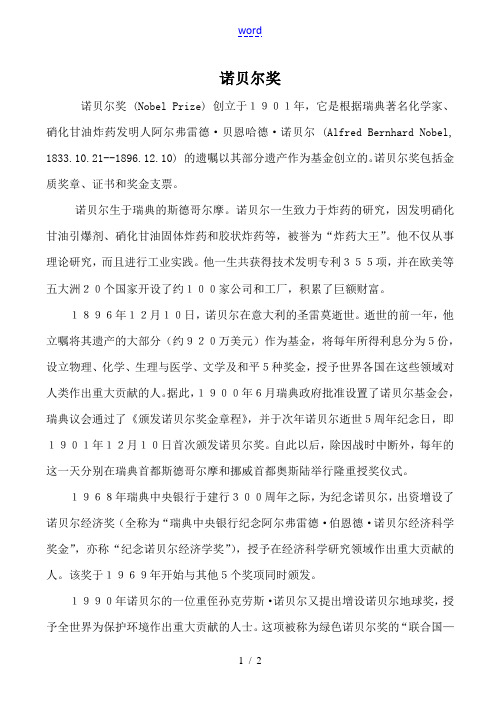
诺贝尔奖诺贝尔奖 (Nobel Prize) 创立于1901年,它是根据瑞典著名化学家、硝化甘油炸药发明人阿尔弗雷德·贝恩哈德·诺贝尔 (Alfred Bernhard Nobel, 1833.10.21--1896.12.10) 的遗嘱以其部分遗产作为基金创立的。
诺贝尔奖包括金质奖章、证书和奖金支票。
诺贝尔生于瑞典的斯德哥尔摩。
诺贝尔一生致力于炸药的研究,因发明硝化甘油引爆剂、硝化甘油固体炸药和胶状炸药等,被誉为“炸药大王”。
他不仅从事理论研究,而且进行工业实践。
他一生共获得技术发明专利355项,并在欧美等五大洲20个国家开设了约100家公司和工厂,积累了巨额财富。
1896年12月10日,诺贝尔在意大利的圣雷莫逝世。
逝世的前一年,他立嘱将其遗产的大部分(约920万美元)作为基金,将每年所得利息分为5份,设立物理、化学、生理与医学、文学及和平5种奖金,授予世界各国在这些领域对人类作出重大贡献的人。
据此,1900年6月瑞典政府批准设置了诺贝尔基金会,瑞典议会通过了《颁发诺贝尔奖金章程》,并于次年诺贝尔逝世5周年纪念日,即1901年12月10日首次颁发诺贝尔奖。
自此以后,除因战时中断外,每年的这一天分别在瑞典首都斯德哥尔摩和挪威首都奥斯陆举行隆重授奖仪式。
1968年瑞典中央银行于建行300周年之际,为纪念诺贝尔,出资增设了诺贝尔经济奖(全称为“瑞典中央银行纪念阿尔弗雷德·伯恩德·诺贝尔经济科学奖金”,亦称“纪念诺贝尔经济学奖”),授予在经济科学研究领域作出重大贡献的人。
该奖于1969年开始与其他5个奖项同时颁发。
1990年诺贝尔的一位重侄孙克劳斯·诺贝尔又提出增设诺贝尔地球奖,授予全世界为保护环境作出重大贡献的人士。
这项被称为绿色诺贝尔奖的“联合国——地球是一体”奖于1991年6月5日世界环境日之际由“地球是一体”协会在联合国的赞助下首次颁发。
诺贝尔奖自1901年颁发以来,共有六位华人获得诺贝尔科学奖,他们分别是李政道、杨振宁、丁肇中、李远哲、朱棣文和X琦。
- 1、下载文档前请自行甄别文档内容的完整性,平台不提供额外的编辑、内容补充、找答案等附加服务。
- 2、"仅部分预览"的文档,不可在线预览部分如存在完整性等问题,可反馈申请退款(可完整预览的文档不适用该条件!)。
- 3、如文档侵犯您的权益,请联系客服反馈,我们会尽快为您处理(人工客服工作时间:9:00-18:30)。
Come up with
He came up with an idea for a hybrid rice in the 1960s.他在二十世纪六十年代产生了发 明一种杂交水稻的想法。 Come up with意思是“找到或提出(答案或 办法等) He couldn’t come up with an idea. 他想不出办法来。(此处可用think of代替)
Lesson35 China’s Most Famous “Farmer”
Read the text and find the sentences including the following phases or words. 1.So that 2.Graduate from up with 4.Devote oneself/sth. to sth./doing sth. 5.Be honored with 6.Because of 7.Besides 8.It is said that… 9.Nothing but
Lesson35 China’s Most Famous “Farmer”
Listen and fill in the blanks Yuan Longping is a greatscientist in China.He _____ childhood has a _____ dream—to grow a new type of rice which grain is as big as a peanut. Since the devoted 1960s,he _____ himself to making his dream succeeded come true. In 1973,he ________ in the development of hybrid rice. This made China a worldwide ______ leader in rice production and he was horoned ____ with “Father” of Hybrid Rice.
返回
Graduate from
He graduated from the Southwest Agricultural University in 1953. 他1953 年毕业于西南农业大学。 Graduate from毕业于… What are you going to do after you graduate from junior high school? 你中学毕业后打算干什么? 返回
Because of
Because of Professor’s hard work, China now produces enough rice to feed her people every year.由于袁教 授的辛勤工作,现在中国每年生产足够全国人民 食用的水稻。 because of:因为,由于。相当于with或thanks to Because of (With/Thanks to) your help, I finished the work.
Translate
1.爱因斯坦荣获了“科学之父”的称号。 was honored with Einstein ____ _____ ____Father of Sicence” 2。许多新药品被白求恩介绍到了中国。 Many kinds of new medicinewere introduced ___ _______into China by Bethune. 3。据说袁龙平喜欢拉小提琴。 It ___ ___ __ is said that Yuan Longping likes playing the violin. 4。在他的业余时间,他喜欢游泳。 In his spare time ___ ___,he likes swimming ______. 5。他只关心他的工作。 He cares about nothing ___ his work ____ but
Be honored with
He was honored with the name “Father” of Hybrid Rice.他被誉为杂交水稻之父的美名。 Be honored with…被誉为… Mao Zedong was honored with the “sun” of China. 毛泽东被誉为中国的太阳。 返回
return
Devote… to…
Since then,he has devoted himself to research and the development of new varieties.从那时起,他就一直 致力于这项研究以及新品种的开发。 Devote oneself/sth. To sth./doing sth.献身于,致力于 He devoted all his spare time to the study of history. 他把他所有业余时间都用来研究历史。 They devoted themselves to helping the disabled people. 他们致力于帮助残疾人。 返回
So that
The grain of this new type of rice would be as big as a peanut so that farmers could rest in the cool shadows of big rice plants. 这种新型水稻的米粒会象花生一样 大以便农民们能在很大的稻秧 的阴凉里休息。 So that引导目的状语从句,意思是 “为了,以便”,句中常有情 态动词can, could, may, might等, so that还可表示结果,意为“因 此,结果”,so that前常有逗号 隔开。 1.We all study hard so that we can pass the exam. 我们都努力学习以便能通过考试。 2.He got up early,so that he caught the first bus. 他早早起床,因此赶上了第一班车。
It is said that…
It is said that Professor Yuan is one of the richest people in China.据说袁教授是中国最富的人 之一。 It is said that…据说… 类似说法还有It is reported that…据报道… It is thought / believed that…人们认为/相信… It is said that he was a great singer before. return
Fill in the blanks
(B )1.He graduate __ Tsinghua University in 1953. A.To B.from C.in D.into (A )2.He devoted himself to__ Chinese people in war. A.helping B.help C.helped D.helps (C )3.__ a man teacher,there are five women teachers in the office. A.Except B.Except for C.Besides D.Maybe (C )4.He got a good mark___ his hard work. A.so B.because C.because of D.if (C )5.He came up with an idea for a hybrid rice____. A.in 1960s B.in the 1960 C.in the 1960s D.in the 1960s’
返回
besides
Besides many other countries including the U.S., have benefitted from his work.其他许多国家包括美国, 也从他的工作中受益。 Besides除了…之外(还有) 句) Five students have passed the exam besides Li Ming.除 了李明之外还有五个同学通过了这次考试。 Everyone laughed except the teacher.除老师之外大家 都笑了。 返回
Nothing but
But he cares nothing but his research.但他除了 他的研究之外什么也不关心。 Nothing but仅仅,只。相当于only There is nothing but a card in the box. 这个盒子里只有一张卡片。
return
